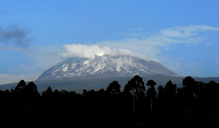“We were afraid you were a Tanzanian trying to expose us so we were not sure if we should respond…you know, it can be dangerous because we are not yet strong in our groups to confront the homophobia of the police, our families and our employers.”
So began my first interview with one of the leading Tanzanian lesbian activists as Ashura (not her real name) and I talked over lunch in central Dar es Salaam (Dar, for short) on the east coast of this central Africa country.
I had traveled across the entire vast green expanse of Tanzania–about a thousand miles–by way of enormous Lake Victoria (source of the Nile), the famous Serengeti Plain, the animal-filled Ngorongoro Crater and majestic snow-capped Mt. Kilimanjaro (image above) to Dar on the Indian Ocean before I met Ashura and other activists. At first they were not easy to find; my e-mails and text messages went unanswered and I was afraid I’d leave the country without seeing any LGBT folks here or gaining any understanding of the ‘scene’.
Finally Ashura came through by phone (Africans are very connected by cell phones) and we talked about her first meeting me alone to assure other LGBT people I was not a lawman or a spy. The hesitation to trust a stranger is understandable. Homosexuality in Tanzania is a crime punishable by 30 years to life imprisonment for ‘offenses against nature’. (The law was revised upward from 14 years imprisonment in 2002.) In light of this draconian law, she asked her identity be kept confidential, using the pseudonym Ashura.)
As well, nearly every day I read in the several English language newspapers (Kiswahili is the official language and English is the second language) about suspected thieves being lynched or clubbed or burned to death by local vigilante mobs of men taking the law into their own hands. There have been no reports of anyone getting killed for being gay, but the impulsive readiness of mob violence evokes a steady cautiousness in LGBT people to maintain constant vigilance.
There is a LGBT organization in Tanzania: LGBT Voice–LGBT (Facebook)
Ashura and ‘The Association’
‘The Association’ is a pseudonym for the one and only lesbian organization in the country. In Tanzania all groups have to register with the government and this one is no exception. Of course, disclosing their true identity would be risky so the women present themselves as a women’s empowerment group under a different name to protect their identity, which I have named The Association.
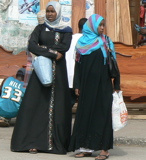 It currently has more than 100 highly invisible members across the country. In 1998 it started by friends as an informal social group and by 1999 most of the women were interested in forming an organization with a higher purpose. Not everyone liked the idea but the time felt right for the country to have an identified LGBT association.
It currently has more than 100 highly invisible members across the country. In 1998 it started by friends as an informal social group and by 1999 most of the women were interested in forming an organization with a higher purpose. Not everyone liked the idea but the time felt right for the country to have an identified LGBT association.
The ‘old guard’ women, many in couples, helped with donations and the younger more assertive women formed a initial group called the Lesbian Youth Group with a mission to educate people about ‘diversity’ through art and culture such as music and dance performances in a non-confrontational manner consistent with The Association’s style of integrative activism.
Invitation to join is spread by word-of-mouth around town, including in the several gay and gay-friendly bars and clubs in Dar es Salaam, a sprawling city of three million. Numerous issues have arisen for the women as they have developed Tanzanian Lesbian Association’s goals and strategies.
Ashura said one of the significant challenges is to get different classes of women to operate together. Tanzania is economically class-conscious with middle and upper class women reluctant to socialize with women in lower socioeconomic levels. There are different venues in Dar that tend to separate out the classes with each patronizing their favorite club. Often the flavor of a club is determined by the owner who caters to a preferred type of customer: some venues are gay male friendly, some are lesbian-friendly, some are mixed along with some hustlers and sex workers.
Poverty and Progress
It’s not easy developing a grass-roots LGBT organization here because of the criminal status of homosexuality; the movement is fledgling, cautious and still finding its way. Most of Tanzania is agricultural with most work done by peasant families and workers with only primary (eighth grade) education and not a whisper of awareness about human rights, gender or sexuality issues—despite a claim that 40% of Tanzanian men engage in sex with other men, with 100% denial.
(Many of these men are married which complicates the heterosexual HIV/AIDS transmission problem: how does one publicly address denied and secretive sexual behavior? And how does a wife protect herself with condoms without implying or directly accusing her spouse of taboo but common extramarital activity?)
There is no precedent for gay activism here and many LGBT members and leaders do not have the independence, finances or time to go to leadership seminars or organizational meetings outside Tanzania; occasionally IGLHRC (Outright) sends a consultant, as does HIVOS from Holland or Astrea Lesbian Fund.
Lack of money is a chronic problem. Tanzania, as an independent country, is hardly that: it depends on foreign government aid for over 40% of its gross national income. Hundreds of NGO’s, UN agencies and religious/charity organizations help keep the nation afloat with their donations and/or missionary health and education services across the country (indeed, across the whole continent). Micro-financing is becoming popular and common but cannot be called a driving economic force yet.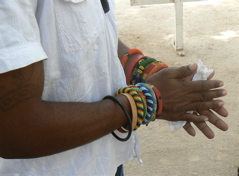
But since The Association and CPSS (the men’s organization; more later) don’t yet have strong organizational presence or an impressive list of achievements or any reliable friends in high places, they can only compete modestly for international funding.
And they have to walk a fine line of discretion as an LGBT organization, careful to couch their full truth within wider missions such as women’s rights or HIV/AIDS education or local sponsors of community arts and sports events. In return, pro-gay donor countries such as Norway and Holland also must be discreet so as not to be seen as funding an organization that is illegal in Tanzania.
A Fragile Scene
Nevertheless, inside the city limits of Dar there is a quietly thriving LGB community with interconnecting circles of friends meeting privately in homes or in the half dozen venues that are gay friendly, such as Ma Chain Club (mixed gay/straight), Mama’s Club (women), Q Bar (mixed, including sex workers) or Club Oasis in trendy Oyster Bay district popular with men.
Still, a dense population is no guarantee of privacy or indifference: in 2007 a lesbian couple were forced out of their apartment in Dar when neighbors highly suspected they were gay and became threatening and vocal in their disapproval, protesting their presence and creating a scandal that reached the local (unfriendly) newspapers.
Another incident that scandalized gays in Dar happened when two lesbians, socializing with a dozen other friends at Mango Club, had too much to drink and were found fondling in the ladies room, which soon blew up into another moment of media hysteria. It resulted in The Association being thrown out of their office. 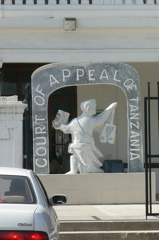
But instead of caving in, Ashura sought a lawyer to protest against the landlord’s discrimination; it took several biased rejections until they found a supportive attorney whose advice was not to take the case to court but rather let time pass and give no interviews to the press. Going to court would only expose The Association to further negative attention and, since homosexuality is a criminal offense, many would perceive The Association as attempting to be above the law. In the end, they did ‘escape’ with their office equipment and changed their phone number.
Currently there is no recourse for gays in Tanzania against such prejudice and intolerance.
Meanwhile, despite the drama of The Association, Ashura the undaunted one, has had two significant relationships, the second of which has endured now for more than several years. With little effort they found a place to live together and without much attention from anyone (so far; picking the right neighborhood is important) since big city women commonly live together for financial reasons or because they are related.
Hope and Courage
The Association’s troubles have emboldened Ashura and the membership—as women in a patriarchal society and as lesbians in a homophobic culture. Their set goals are to bring awareness to an unenlightened country (at least the major cities) by offering health programs and educational discussions about women’s issues (power, equality, sexual protections) at the local community level, and about more generalized awareness regarding diseases such as malaria offering free mosquito nets and teaching about improving water quality.
In this manner, The Association integrates itself in local affairs and neighbors get to know the women not as lesbians but as charity caring workers for the common good. Slowly, as friends, they can be known, if others ask, for who they are: women loving women. Those who want to know more are free to ask. The Association discreetly asks questions about new members, but more commonly much is understood without words, said Ashura.
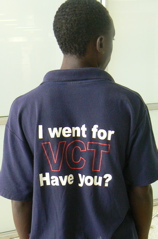 In addition to women’s social and education work The Association focuses quietly on health care workers who deal with HIV testing and counseling. Many health workers are uneducated about MSM and WSW and the variant sexual details of disease transmission among this population. (Ashura calls these ‘entry and exit points’).
In addition to women’s social and education work The Association focuses quietly on health care workers who deal with HIV testing and counseling. Many health workers are uneducated about MSM and WSW and the variant sexual details of disease transmission among this population. (Ashura calls these ‘entry and exit points’).
There is always a need for more trained HIV-test counselors who can deal with same-sex behavior in a mature manner since homosexuality for many does not exist and is therefore not targeted in the national prevention programs.
Across Africa there is a network of voluntary counseling and testing centers–VCT’s. Kenya’s highly organized and developed Liverpool VCT program has assisted The Tanzania Association in training three members for HIV counseling and testing who in turn have trained other Association members in Tanzania for counseling.
It is hoped in the future to lobby the Ministry of Health on behalf of WSW and MSM to increase awareness of gay issues since these people already receive HIV care in hospitals and clinics throughout the country. Research for this purpose has been offered by Norway but so far only MSM are included in the proposal. The Tanzanian health ministry has not agreed to include WSW in this work since “lesbians don’t exist” here.
Funding for this and other The Association projects has come from the Astrea Foundation, HIVOS in Holland and some member donations from prosperous black women in Tanzania. Even so, funding is usually restricted for specific events or programs and there is little left for supporting volunteers and leaders, although Ashura said there was one employed person, herself, in The Association.
Happily, The Association managed to send representatives to the (now defunct) OutGames Human Rights Conference in Montreal in 2007 which served as an inspiring boost to their distant work in Tanzania. How proud these women must have felt to hear speeches by such eminent leaders as three openly-gay Supreme Court Justices from South Africa, Australia and Argentina; or listen to the United Nations High Commissioner for Human Rights, Judge Louise Arbour, declare that “everyone deserves equal rights—no exceptions!”
Research and Change
As if this were not enough to keep The Association busy for several years, Ashura said they want to do research and write documentation about sexual abuse of women, especially lesbians, that can be passed on to Tanzanian Human Rights organizations; this is awkward because some of them are not known to be friends of LGB citizens. Even the former director of Amnesty International-Tanzania, who was somewhat supportive, has not shown any interest in bringing about awareness change in official circles. Even though the constitution prohibits discrimination against anyone, it is an abstraction that has little influence in the streets where people live and work and mask their truth with silence and smiles.
Ashura expressed her intention that once the documentation is complete international human rights organizations will give assistance to their research and help influence change in Tanzania’s negative laws and opinions toward LGBT people.
Even in the respected University of Dar es Salaam not a single professor is willing to offer LGBT human rights leadership or support, including anyone from the law faculty–unlike Prof. Sylvia Tamale in the Faculty of Law in Nairobi’s Makerere University who has been publicly vocal on this issue.
Ashura said there is a strong call for legal, medical and organizational assistance from international rights organizations and NGO’s to help give forceful and weighty guidance in this direction. When a respected Dutch consultant from HIVOS came to Tanzania to lecture and discuss with other NGO’s about LGBT human rights there was polite but clear denial and resistance to his visit (i.e. “it’s not an issue here because there are very few homosexuals in Tanzania…” said one official.) For example, although there is a program called the Tanzanian Gender Network Program, an NGO sponsored by HIVOS, the leadership has not been responsive to The Association’s requests for discussions.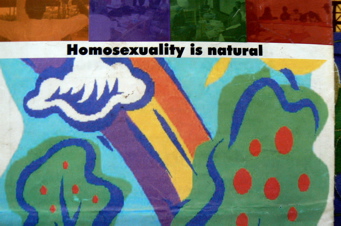
As well the media needing their own training and education about LGB issues so the reporting begins to shift away from homophobic ignorance to more tolerant and understanding perspectives. One of The Association’s members is a journalist who has begun the slow work of persuading other journalists to reconsider their attitudes.
The list of offenses against LGBT Tanzanians, overt and hidden, personal and official is long and will take generations to move toward fairness. But recent political changes (within the past ten years) at the highest levels of government had begun to show some progress toward more honest and fair democratic policies and attitudes under the previous President Kikwete (the most liked and least corrupt president Tanzania has had since independence from Britain in 1961).
Unfortunately the current populist President Magufuli is more impulsive and authoritarian and not a friend of LGBT citizens.. The Economist magazine has said “Mr Magufuli is fast transforming Tanzania from a flawed democracy into one of Africa’s more brutal dictatorships. It is a lesson in how easily weak institutions can be hijacked and how quickly democratic progress can be undone.” It is reported that a task force has been set up to identify and punish gay people, clearly a step backward in human rights.
Further information about lesbian Africans can be found in an informative book published in 2005 in South Africa: ‘Tommy Boys, Lesbian Men and Ancestral Wives’. Chapter two of the book focuses on the difficult lives of women in Tanzania and includes personal stories of their self-discoveries and attempts to live normal lives.
Allan, Jon and CPSS
In addition to Ashura I spoke to two leaders of the men’s Community Peer Support Services (CPSS), the main—indeed, the only–gay men’s organization in Tanzania. Claiming over 475 members throughout this country of 35 million people, CPSS has ten sub-groups or zones across the land. Allan is the chairman of CPSS and Jon (not their real names) is the program coordinator. Together in Dar es Salaam they design programs intended to advance equal rights, increase awareness of diversity and educate people about HIV preventions and care.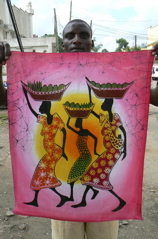
Like many gay organizations in repressive homophobic countries, CPSS does not present itself as gay but rather as an HIV education and awareness program offering community-based activities and information as a means of helping others and becoming a familiar local helping hand—not unlike the women’s Association. As well a serving others such charitable activity also helps qualify CPSS to receive some limited funding from international donors who must, in turn, be sensitive to the laws of recipient countries.
In Tanzania homosexuality is a criminal offense which forces funders from liberal pro-gay countries such as Holland and Norway to find ways of spiriting money to groups without offending authorities. As part of their protective guise, CPSS has established a ‘cover’ organization with a different name through which foreign donations can be received—a common tactic throughout homophobic Africa.
Such cautiousness, I asked Allan, is it really necessary? Has anyone actually been busted? “Yes,” he replied, “last year a man in Zanzibar was caught in a sexual relationship. He was jailed, tried and sentenced to 34 years in prison. The term was later reduced to 30 years.”
As we spoke in the quiet of my hotel restaurant with few others present it was clear that both Allan and Jon were apprehensive about being overheard. “The person to your left is staring at us and I don’t feel safe,” wrote Jon on my pad. But shortly after, the man left and we resumed our topic. Much as these courageous men are proud of their work, and despite being in a major metropolitan city, they still operate within a society that is filled with anti-gay negativity, harmful gossip and rumor that can humiliate and ridicule vulnerable people, destroy reputations and careers and break up families.
Similar to the women’s Association, CPSS focuses on charity and health work to increase their local visibility and become integrated into neighborhoods in all ten zones. They sponsored a sports bonanza co-sponsored with a non-gay organization that offered competitions in 10 sports and attracted about 500 kids in various age groups.
In the process of having fun the kids received age-appropriate information about health issues including HIV, self-respect, personal hygiene and the importance of education. Such events of course are expensive since there are T-shirts and food and awards to be made. CPSS operates on a very limited budget and as usual funding is tight and the need is always high. This is sub-Sahara Africa where the HIV rates (mostly heterosexual) are among the highest in the world.
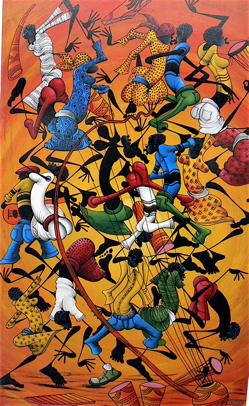 Another focus for CPSS is the local environment. They engage with residents of neighborhoods for clean-up days to improve living conditions, eliminating trash and stagnant water to reduce mosquitoes.
Another focus for CPSS is the local environment. They engage with residents of neighborhoods for clean-up days to improve living conditions, eliminating trash and stagnant water to reduce mosquitoes.
“This is the way we want to work, as a community organization so people come to know us as their friends first and then only maybe later, if it comes up, about our sexuality. By then we hope we are known as good helpers and educators and sports sponsors and not as a label of ‘gays’ that scare people and turn them against us. We don’t push a gay agenda,” said Jon, “we do it the African way.”
Personal Scene
As with the lesbians, the men (in Dar es Salaam) function in a lively yet closed social network of intersecting friendship circles in private homes, gay-friendly venues and at CPSS meetings (where, Jon said with a playful smile, is the only safe place to cruise!).
Needless to say the entire network is virtually invisible from the outside as homophobia always threatens to unmask or arrest people. Allan should know. He narrowly escaped capture last year when he was dating a younger man whose parents found out about them and called the police. When the officers showed up at Allan’s residence he was not at home and the cook said Allan was out of town. In truth he was only three doors away. Afterwards the cook reported to Allan who immediately left town for several months until the heat was off. Sadly the young friend is now estranged from his family and Allan does not go near the parents’ neighborhood even though they do not know his face. “I’m always nervous,” he said. “You cannot imagine how it is to always feel threatened by such a legal rule.”
Jon said the consequences for being ‘outed’ are dire. Jobs, reputations and family honor are at stake. Allan attributed this to poor education, the conservative culture, narrow-minded religion and rigid adherence to heterosexual traditions, all which inhibit personal freedom and cast a shadow on the progress of pro-gay efforts.
That said, if a queer Tanzanian is discreet and doesn’t make a public scene or act inappropriately a man or woman can have a moderately comfortable and safe life with a partner and gay friends in Dar, Zanzibar City, Arusha or Mwanza–Tanzania’s other major cities.
In the Provinces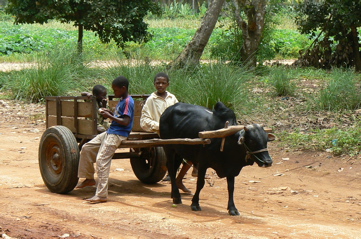
But not in rural villages however. Outside the city limits, where the vast majority of Tanzania’s 35 million people live, peasant farmers raise families to help work the land, planting rice and harvesting corn or coffee. Education for many ends at 14 due to lack of secondary schools fees—and often so does a girl’s virginity as she is likely to be married off to an ‘enforced’ spouse.
(Child marriages are being criticized by the UN and private women’s organizations because, among other reasons, a girl’s education stops when she becomes pregnant, which severely limits her ability to earn money or become independent if her husband dies–the average male life expectancy is under 50–or abandons her, not uncommon in Africa. (Working in favor of child marriages is the bizarre myth that intercourse with a virgin child will cure a person of a sexually transmitted disease.)
Sexual identity and personal expression are far down the list of privileges. Any budding same-sex desire dissolves into adherence and loyalty to one’s family and tribe and into minimal-education work such as tending goat herds, furniture making or delivering charcoal fuel by ox-cart. Of course, sexual desire does emerge and carnal combinations happen, but for rural MSM and WSW the connection is usually without any understanding of sexual orientation or same-sex romance and is internalized as ‘just something that happens’.
In the Cities
However, if a person does understand they are ‘different’, a private gay life can be lived in an invisible manner with carefully crafted masks and socially acceptable disguises, the most common of which is marriage and kids, whether out of self-ignorance or deliberate deception.
Dar es Salaam’s millions of denizens provide anonymity and a highly cosmopolitan mix of foreigners, professionals, UN personnel, NGO employees and an educated and prosperous middle class.
In Arusha and Mwanza, the next largest cities, there are scattered members of The Association and CPSS but clearly no visible ‘scene’ to be found in the streets and markets of either city. A slight presence may be found in the tourist beach areas but even there it’s difficult to determine if one is gay or gay-for-pay among horny foreigners (muzungus). (During my week in a Zanzibar beach resort I didn’t see any behavior that appeared to be gay cruising.)
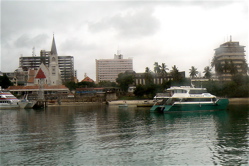 In Dar, Allan said he has lived most of his adult life in the city. For twenty of those years he lived with his beloved Abdul whom he originally met at the bank where they both worked—until it was discovered they were a gay couple and fired because they were a “bad example”, with no recourse to legal action.
In Dar, Allan said he has lived most of his adult life in the city. For twenty of those years he lived with his beloved Abdul whom he originally met at the bank where they both worked—until it was discovered they were a gay couple and fired because they were a “bad example”, with no recourse to legal action.
It was their dismissal that gave impetus for their starting (with Jon) CPSS in 1997 as a charitable health NGO as a means of supporting themselves, doing charity work and helping isolated and alienated gay men with no place to turn. The initial funding came from the three founders. There was no LGBT group anywhere in the country at the time.
Since then CPSS has grown (membership costs 1000 Tanzanian shillings a year–about US$85); they use code words to identify among themselves. Unfortunately Abdul succumbed to AIDS in 2005—more accurately, from incompetent homophobic medical treatment as well as the virus.
Allan’s entire family of seven siblings (two of whom—brothers—are also gay) know about his orientation. Jon originally worked for a government agency that approved construction projects during the socialist period after independence. But eventually the ministry was made redundant as privatization replaced state controlled agencies and industries. More recently he has been engaged on occasion as a contractor with his class-seven licensed building company based in Dar es Salaam, which has built residential buildings.
In 2005 he campaigned for a seat in the parliament and learned the hard way about corruption, greed and turf wars among government ministers and MP’s with not-so-hidden agendas for manipulating power and money to their favor. “These are evil people, terrible. I would start over with a machine gun and remove them all. They are criminals becoming rich while so many live poor and we have such bad roads and dirt and chaos in our cities and streets,” he decried in a moment of heated frustration.
Gay and lesbian Tanzanian activists are engaged in a great challenge, to begin a delicate dialogue with the government to reconsider the criminal status of same-sex behavior and open a small window of tolerance in a culture that is ignorant and prejudiced against sexual difference within its population.
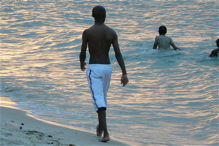
Curious Sexual Sidebar
A curious sidebar from Jon about sexual behavior involves anal sex among heterosexuals. He claimed research indicates that two thirds of men prefer anal sex with women over vaginal sex. The reasons are unclear but such behavior is very secretive and, according to Jon, serves as a convenient ‘disguise’ for gay men who prefer anal sex and not vaginal sex. Having anal sex with a woman can both mask their true orientation while allowing them the pleasure of sex.
Impromptu in Zanzibar
Suraka is a 23 year old Tanzanian heterosexual receptionist at the Sunset Bungalows in Kendwe village on the west coast of the island. With a ready smile and a soft masculine bearing he checked us and showed us to our modern and stylish room near the beach along azure blue water. Like many other employees he was more than laid back. Between arrivals he sat on a wood-and-cushion couch across from the reception desk, leg up, barefooted, with low-rise black jeans and a Sunset Bungalows T-shirt. On the back their logo: no bikini, no party. After a few settling-in questions and answers the white sandy beach, sun and pine trees and waterfront restaurant were ours to enjoy.
A couple of days later I approached him and discreetly asked if he knew any homosexuals in Zanzibar. His reaction was calm as he thought for a moment and said he didn’t know anyone directly but knew there were some in Stone Town and knew that others worked in the various resorts along Zanzibar’s coast.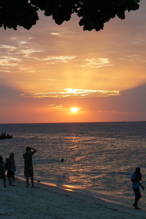
GG: What is your opinion of these people?
I don’t know why they want to do that. It’s not a good way to be for them, I think.
GG: If a friend of yours said he was gay would you still be friends?
I don’t think so. It is strange for them that way. I don’t know why. Maybe the parents did not advise them in a good way. Maybe they are confused and do not have normal friends with girls.
GG: Would the family reject the gay person?
Maybe, or maybe say nothing or make them be married. I don’t know.
GG: Do you have a strong bad feeling about gay people?
Not strong but yes a feeling, more like feeling sorry for them; they are not right and maybe they need advice to correct their way. But if they are famous and everybody knows then it doesn’t matter. It’s okay and people accept that.
GG: There are gay people here?
Yes, I think so in the tourist areas there are such people who look for sex, for man or woman. We know this and it happens in the tourist sections—like in Mombassa (Kenya). But not so in the small villages away from here. There it is not good, not allowed to be that way. Local people don’t understand this and will not accept it.
After a pause, Suraka seemed puzzled by his own lack of knowledge about homosexuality and his inability to explain better the issue in his country: “I will put my head down and think about this and give you a better opinion later,” he said.
It was obvious he had never been asked about homosexuality and had little understanding of it—not unusual for the vast majority of straight Tanzanians.
A Visit to Q Bar/Restaurant in Oyster Bay
Q-Bar in Dar is not a polished place, with picnic benches for dining tables and several stand-up drinking tables; half a dozen TVs for watching sports events; two bars offer dozens of alcohol drinks; the food menu offers the usual chicken-beef-fish with rice or chips; open to the sky with upstairs and downstairs seating; and a guesthouse with a couple dozen rooms ranging from backpacker bunks to oversized ‘executive’ rooms; an en suite single is US$45.
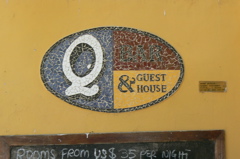 About 9 PM the place starts to liven up as friends and strangers show up in singles, couples or small groups looking for a chat, a smoke, a drink or a meal. On this particular night, under a full moon in February, by 9:30 PM there were distinct ‘types’ gathered at tables and bars. The most visible were the prostitutes with their stylishly tight outfits, movie-star make-up and an ever-ready ‘halloo’ on their lips. Veronica had her eye on me from the first moment and waited until I finished my dinner before she came over and introduced herself. But before she could warm up a vacuous conversation I excused myself.
About 9 PM the place starts to liven up as friends and strangers show up in singles, couples or small groups looking for a chat, a smoke, a drink or a meal. On this particular night, under a full moon in February, by 9:30 PM there were distinct ‘types’ gathered at tables and bars. The most visible were the prostitutes with their stylishly tight outfits, movie-star make-up and an ever-ready ‘halloo’ on their lips. Veronica had her eye on me from the first moment and waited until I finished my dinner before she came over and introduced herself. But before she could warm up a vacuous conversation I excused myself.
Across the room were several men, in couples or threes or fours meeting after work at the numerous embassies in Dar, NGO’s and commercial offices in the areas, both European whites and local blacks chattering at each other above the house music, many fuming cigarette smoke. Another cluster was ‘tom boys’—young women with lean figures dressed in jeans and shirts looking very butch. Near them was a hetero couple obviously entangled in a cat-and mouse conversation of nonsense verbal foreplay. This was clearly a mixed place with cross-currents of interest: WSW, MSM, MSW and variations in between.
The energy level was bubbly and appeared free of the paranoia I had heard about for two days during my interviews with activists. This was a person-to-person local LGBT/straight pick-up and cruise scene where people were left to their own choices without risk of being busted by police. And this was only 9PM; by eleven or midnight the crowd increases (I was told) and the night’s dark shadows provide cover for discreet or indiscreet liaisons that satisfy hidden desire with little risk.
The scene repeats itself nightly and Tanzanians in need of contact, friendship or a fuck live out their night lives as counterbalance to the required restraint of daylight, professions and domestic responsibilities.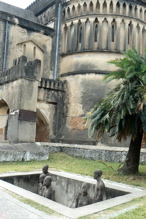
History note: the image (right) is of the slave trade memorial in StoneTown, Zanzibar. From this island port hundreds of thousands of captive slaves, stolen from their homelands, were shipped abroad to Asia and Americas. Discrimination has a long tortured history; it started here, among other ports.
Also see:
Gay Tanzania News & Reports 2003 to present
Gay Tanzania Photo Galleries
Blog from LGBT Voice Tanzania

